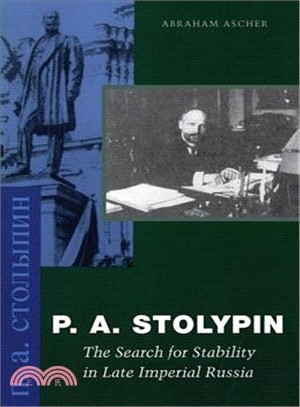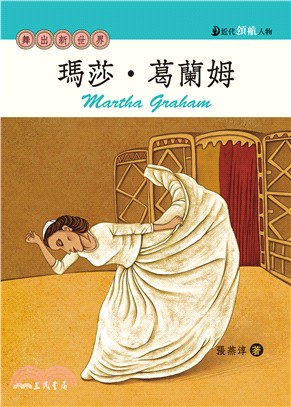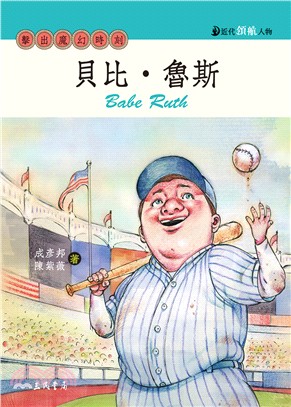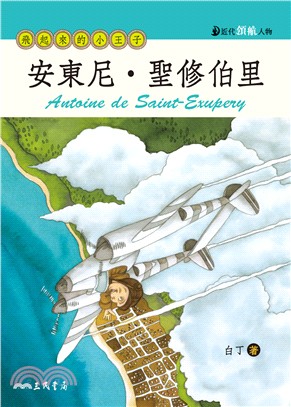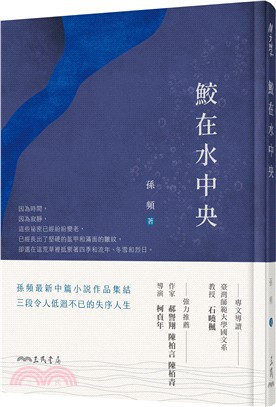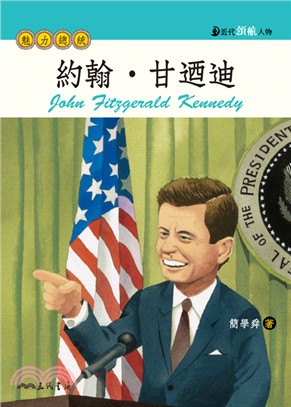P. A. Stolypin ─ The Search for Stability in Late Imperial Russia
商品資訊
ISBN13:9780804745475
出版社:Stanford Univ Pr
作者:Abraham Ascher
出版日:2002/05/01
裝訂:平裝
規格:22.2cm*15.2cm*3.2cm (高/寬/厚)
商品簡介
作者簡介
相關商品
商品簡介
This is the first comprehensive biography in any language of Russia’s leading statesman in the period following the Revolution of 1905. Prime Minister and Minister of Internal Affairs from 1906 to 1911 (when he was assassinated), P. A. Stolypin aroused deep passions among his contemporaries as well as subsequent historians.
In the twilight of Nicholas II’s reign he was virtually the only man who seemed to have a clear notion of how to reform the socioeconomic and political system of the empire. His efforts in that direction?in agriculture, local administration, religious freedom, social legislation, the legal system?were radically new departures for the Russian state. His detractors disdained him as a power-hungry, coldhearted politician who was unscrupulous in pursuing his own career and would use any means to restore the tsarist autocracy following the frightening turbulence of 1905. Stolypin’s admirers, however, argued that he was a man of vision who pursued policies that would have transformed the country into a modern state with social and political institutions comparable to those of the West.
Lenin’s celebrated denunciation of Stolypin as ?hangman-in-chief” set the tone for official Soviet work on his career. In the West, some historians and emigre writers, most notably Aleksandr Solzhenitsyn, erred in the opposite direction. By contrast, this book?on the basis of extensive Russian archival documentation only recently available to historians?seeks to provide a balanced portrait of Stolypin that encompasses the complex, even divergent, impulses that motivated him.
Although Stolypin did not shrink from the use of force to stamp out unrest, he lamented the shedding of blood and much preferred nonviolent means to curb the opposition. In foreign affairs, he was uncompromising in his insistence that Russia should avoid entanglements that could lead to military conflict. To be sure, he was deeply committed to monarchical rule, but he did not consider it advisable to abolish the elected legislature or to deprive it of its authority. Stolypin’s program, a blend of reformism, authoritarianism, and nationalism, was more likely than any other to lead Russia toward social and political stability. But Tsar Nicholas II, his entourage, and ultra-conservatives could not bring themselves to yield a portion of their privileges and prerogatives in return for a reduced, though still significant, role in a changed Russia. They succeeded in undermining the Prime Minister’s attempts at fundamental reform and thus scuttled Imperial Russia’s last such attempt before its demise.
In the twilight of Nicholas II’s reign he was virtually the only man who seemed to have a clear notion of how to reform the socioeconomic and political system of the empire. His efforts in that direction?in agriculture, local administration, religious freedom, social legislation, the legal system?were radically new departures for the Russian state. His detractors disdained him as a power-hungry, coldhearted politician who was unscrupulous in pursuing his own career and would use any means to restore the tsarist autocracy following the frightening turbulence of 1905. Stolypin’s admirers, however, argued that he was a man of vision who pursued policies that would have transformed the country into a modern state with social and political institutions comparable to those of the West.
Lenin’s celebrated denunciation of Stolypin as ?hangman-in-chief” set the tone for official Soviet work on his career. In the West, some historians and emigre writers, most notably Aleksandr Solzhenitsyn, erred in the opposite direction. By contrast, this book?on the basis of extensive Russian archival documentation only recently available to historians?seeks to provide a balanced portrait of Stolypin that encompasses the complex, even divergent, impulses that motivated him.
Although Stolypin did not shrink from the use of force to stamp out unrest, he lamented the shedding of blood and much preferred nonviolent means to curb the opposition. In foreign affairs, he was uncompromising in his insistence that Russia should avoid entanglements that could lead to military conflict. To be sure, he was deeply committed to monarchical rule, but he did not consider it advisable to abolish the elected legislature or to deprive it of its authority. Stolypin’s program, a blend of reformism, authoritarianism, and nationalism, was more likely than any other to lead Russia toward social and political stability. But Tsar Nicholas II, his entourage, and ultra-conservatives could not bring themselves to yield a portion of their privileges and prerogatives in return for a reduced, though still significant, role in a changed Russia. They succeeded in undermining the Prime Minister’s attempts at fundamental reform and thus scuttled Imperial Russia’s last such attempt before its demise.
作者簡介
Abraham Ascher is Distinguished Professor of History at the Graduate Center of the City University of New York.
主題書展
更多
主題書展
更多書展今日66折
您曾經瀏覽過的商品
購物須知
外文書商品之書封,為出版社提供之樣本。實際出貨商品,以出版社所提供之現有版本為主。部份書籍,因出版社供應狀況特殊,匯率將依實際狀況做調整。
無庫存之商品,在您完成訂單程序之後,將以空運的方式為你下單調貨。為了縮短等待的時間,建議您將外文書與其他商品分開下單,以獲得最快的取貨速度,平均調貨時間為1~2個月。
為了保護您的權益,「三民網路書店」提供會員七日商品鑑賞期(收到商品為起始日)。
若要辦理退貨,請在商品鑑賞期內寄回,且商品必須是全新狀態與完整包裝(商品、附件、發票、隨貨贈品等)否則恕不接受退貨。



